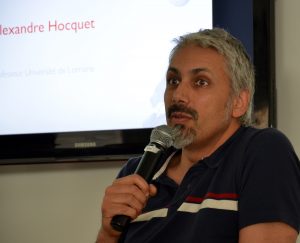Prof. Alexandre Hocquet
c:o/re Senior Fellow 10/2021-03/2022, 11/2022-12/2022

Alexandre Hocquet is Professor of History of Science at the Université de Lorraine, France, and Member of the Laboratory Archives Henri-Poincaré—Philosophie et Recherches sur les Sciences et les Technologies. His focus is on STS, particularly on the relationships between software and the production of knowledge in computational chemistry, but also in Wikipedia and Football Manager. Methodologically, his works rely on the analysis of threaded conversations in web forums or mailing lists. His interest within the history of science focuses mainly on using his previous line of research – computational chemistry – as a case study to highlight the complex relationship between models in computational science and software. He does this work in collaboration with historian and philosopher of science Frédéric Wieber.
Computer Simulations: Software as the elephant in the room
Software as a scientific instrument is “eating” the scientific world, yet, despite its ubiquity, it is surprisingly absent in HPS or even STS accounts of computer simulations. This project strives to address the entangled relationships between computer simulations models and software as a complex socio-technical system. The project began as a history of computational chemistry from the advent of software in the lab until now. From the “software crisis” to the “reproducibility crisis”, computational chemistry is a world full of tensions (and debates) among scientists. Tensions between academic and business norms that stem from the commodification of software have been highlighted (in the IEEE Annals of the History of Computing). The significance of model parameters as an epistemic object that is entangled with the materialities of software has been described (in Perspectives on science). Methodological choices of relying on mailing lists debates to unveil controversies have been explained (in Internet Histories).
Epistemic characteristics have been defined to account for epistemic issues of computational reproducibility that involve software, beyond transparency (in the European Journal for the Philosophy of Science). It has now become a project to advocate for the inclusion of software as a complex socio-technical system to address the scientific practices in computer simulations, in computerized scientific activity in general, and even everything that is “algorithms” or “digital” in science, through the prism of software. Software is much more than code. It is not only written, it is designed, it is packaged, it is licensed, it is distributed, and above all, it is used. Openness. Licensing. Transparency. Black boxing. Reproducibility. The very tensions of this community throughout the 70s to the 2010s are today’s buzzwords in a world of “open science” in “replicability crisis”. We argue that they need to be historicized if they are to be understood.
Publications (Selection)
Hocquet, Alexandre, Wieber, F. 2021. Epistemic issues in computational reproducibility: software as the elephant in the room. In European Journal for Philosophy of Science 11 (38), doi.org/10.1007/s13194-021-00362-9.
Wieber F. & Hocquet, Alexandre. 2020. Models, Parameterization, and Software: Epistemic Opacity. In Computational Chemistry Perspectives on Science 28(5): 610–629.
Wieber, F., Pisanty, A., & Hocquet,Alexandre. 2018. “We were here before the Web and hype…”: a brief history of and tribute to the Computational Chemistry List. In Journal of Cheminformatics, 10(1), 67.
Hocquet, Alexandre, & Wieber, F. 2018. Mailing list archives as useful primary sources for historians: looking for flame wars. In Internet Histories, 2018 (1), April 2018.
Hocquet,Alexandre, & Wieber, F. 2017. “Only the Initiates Will Have the Secrets Revealed”: Computational Chemists and the Openness of Scientific Software. IEEE Annals of the History of Computing, 39(4).


